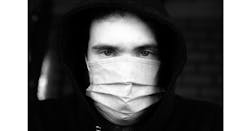Last year during the height of the COVID-19 pandemic, Maryland Gov. Larry Hogan (R) became famous when he made a public service announcement where at the end he looked intently into the camera and said loudly, “Wear the damn mask!” Now it turns out that even where state governments are abandoning mask mandates, employers can still require their workers to wear them.
“Generally, employers have wide discretion when it comes to enforcing safety and health requirements,” says attorney Dana N. Berber of the Akerman LLP law firm. “Under various federal, state and local laws, employers actually have an affirmative obligation to provide a reasonably safe working environment for their employees—as well as for any clients, customers, or other visitors.”
This is particularly the case for employers because the Centers for Disease Control and Prevention (CDC) and the Occupational Safety and Health Administration (OSHA) mandated mask wearing in workplaces, and nothing suggests that the federal government is supporting an end to mask mandates. In fact, President Biden has made it clear that he regards mask wearing as such a clear imperative one of his first acts when he was sworn in was to require it for all federal government facilities.
OSHA’s most recent and highly detailed guidance for employers that was issued on Jan. 29, also at the order of the President, clearly sets out mask wearing as a priority. It even urges employers to provide workers with face coverings at no cost and require non-workers who visit workplaces to wear face coverings as well.
“Any employer looking to continue face covering mandates in its workplace can look directly to OSHA for support,” Berber says, with one possible exception. “Of course, employers must discuss reasonable accommodations with any workers who cannot wear certain types of face coverings due to a disability.”
OSHA’s guidance also cautions employers not to implement measures that would single out employees who are not vaccinated, such as by requiring only unvaccinated employees to wear masks, for example.
“And, as always, employers should continue to take steps to ensure that workers are not retaliated against for raising any safety concerns,” Berber stresses. “These protections against retaliation and discrimination are just as important now as before, especially given that workers may begin to no longer wear face coverings because he/she has been vaccinated.”
This is one of many issues that must be top of mind for those employers facing possible inspections from OSHA after it announced ramped-up enforcement resulting from a recently-declared National Emphasis Program (NEP) targeting COVID-19 in the workplace.
OSHA kicked off this new wave of inspections on March 26. Each of its regional offices will conduct targeted COVID-19 inspections of targets chosen from a randomized list of organizations in sectors responsible for generating the highest number of complaints, including the healthcare industry, warehousing, meat packing, supermarkets and certain kinds of manufacturing.
This NEP will remain in effect through March 12, 2022, unless it is canceled or extended by a new superseding directive. The agency currently forecasts that the enforcement drive accompanying the NEP will generate about 1,600 inspections OSHA-wide in the short term.
“With some exceptions, employers can still mandate face coverings in the workplace as they see fit, especially because mask policies relate directly to safety protocols that ensure the health of employees,” Berber says. “Thus, when faced with employees who are refusing to comply with mask/face-covering rules at work, employers can in fact require that face coverings are worn in the workplace or on the job in accordance with its own policies.”
Continuing to require face coverings may not only make an employer compliant with OSHA standards, it also could end up reducing the threat of liability as they begin to reopen their businesses to employees and the public. Berber points out that employers have been facing swarms of pandemic-related lawsuits filed by attorneys on behalf of employees since last year.
These cases often involve employer liability and claims of wrongful death, negligence, allegations of violation of OSHA standards, and the failure to enforce safety measures. In cases where employers are alleged to have intentionally violated federal, state, or local standards, employees may be able to sue in state or federal court instead of bringing worker’s comp claims, Berber explains.
If employees refuse or fail to comply with mask mandates, employers can discipline and even terminate them in the name of keeping their co-workers and the public safe from the spread of COVID-19, he says. “Employers should ensure that they have established face covering, mask and other COVID-19 policies if they wish to enforce such requirements among all employees.”
About the Author

David Sparkman
David Sparkman is founding editor of ACWI Advance, the newsletter of the American Chain of Warehouses Inc. He also heads David Sparkman Consulting, a Washington, D.C. area public relations and communications firm. Prior to these he was director of industry relations for the International Warehouse Logistics Association. Sparkman has also been a freelance writer, specializing in logistics and freight transportation. He has served as vice president of communications for the American Moving and Storage Association, director of communications for the National Private Truck Council, and for two decades with American Trucking Associations on its weekly newspaper, Transport Topics.
